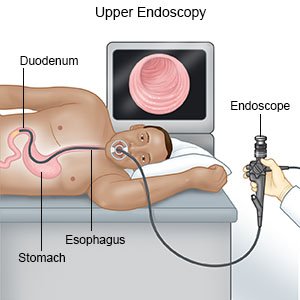Upper Endoscopy
Medically reviewed by Drugs.com. Last updated on Apr 6, 2025.
What do I need to know about an upper endoscopy?
An upper endoscopy is also called an upper gastrointestinal (GI) endoscopy, or an esophagogastroduodenoscopy (EGD).The upper digestive tract includes the esophagus, stomach, and duodenum (first part of the small intestine). A scope (thin, flexible tube with a light and camera) is used to examine the lining of your upper digestive tract. An upper endoscopy is used to look for problems, such as bleeding, polyps, ulcers, or infection.
 |
How do I prepare for an upper endoscopy?
Your healthcare provider will talk to you about how to prepare for your procedure. You may be told not eat or drink anything except water for 6 hours before the procedure. Your provider will tell you which medicines to take or not take on the day of your procedure. Arrange to have someone drive you home.
Drugs used to treat this and similar conditions
Vitamin B12
Vitamin B12 is used for B12 Nutritional Deficiency, pernicious anemia, schilling test, vitamin b12 ...
Silver sulfadiazine topical
Silver sulfadiazine topical is used for burns, external
Omvoh
Omvoh is used to treat moderate to severe ulcerative colitis or Crohn's disease in adults. This ...
Tramadol
Tramadol is an opioid medication that may be used to treat moderate to moderately severe chronic ...
Epoetin alfa
Epoetin alfa systemic is used for anemia, anemia due to chronic kidney disease, anemia prior to ...
Ursodiol
Ursodiol information from Drugs.com, includes Ursodiol side effects, interactions and indications.
Omeprazole
Omeprazole is a proton pump inhibitor that is used to treat symptoms of gastroesophageal reflux ...
Furosemide
Furosemide is a loop diuretic used to treat fluid retention and high blood pressure by increasing ...
Ferrous sulfate
Ferrous sulfate is used to treat iron deficiency anemia. Includes ferrous sulfate side effects ...
Simethicone
Simethicone systemic is used for endoscopy or radiology premedication, functional gastric disorder ...
What will happen during an upper endoscopy?
- You will be given medicine through your IV to help you relax and make you drowsy. You will also be given medicine to numb your throat. You may need to wear a plastic mouthpiece to help hold your mouth open and protect your teeth and tongue. Your provider will gently insert the endoscope through your mouth and down into your throat. You may be asked to swallow to help move the scope. You may feel pressure in your throat, but you should not feel pain. The endoscope does not restrict your breathing.
- Your provider will watch the scope on a monitor and take pictures with the scope. Your provider may gently inject air to make it easier to see your digestive tract clearly. Your provider may take tissue samples and send them to a lab for tests. Foreign objects, tumors, or polyps that may be blocking your digestive tract may be removed. Your provider may also insert tools with the scope to treat bleeding or place a stent (tube).
What should I expect after an upper endoscopy?
Your healthcare provider will monitor you for 1 to 2 hours after the procedure. You may have abdominal discomfort or nausea. You may also feel bloated or gassy. Your throat may be sore for 24 to 36 hours after the procedure. You may burp or pass gas from air that is still inside your body after your procedure. You may need to take short walks to help move the gas out. Eat small meals if you feel bloated. Do not drive or make important decisions until the day after your procedure.
What are the risks of an upper endoscopy?
Your esophagus, stomach, or duodenum may be punctured or torn during the procedure. This is because of increased pressure as the scope and air are passing through. You may bleed more than expected or get an infection. You may have a slow or irregular heartbeat, or low blood pressure. This can cause sweating and fainting. Fluid may enter your lungs and you may have trouble breathing. These problems can be life-threatening.
Care Agreement
You have the right to help plan your care. Learn about your health condition and how it may be treated. Discuss treatment options with your healthcare providers to decide what care you want to receive. You always have the right to refuse treatment. The above information is an educational aid only. It is not intended as medical advice for individual conditions or treatments. Talk to your doctor, nurse or pharmacist before following any medical regimen to see if it is safe and effective for you.© Copyright Merative 2025 Information is for End User's use only and may not be sold, redistributed or otherwise used for commercial purposes.
Further information
Always consult your healthcare provider to ensure the information displayed on this page applies to your personal circumstances.
